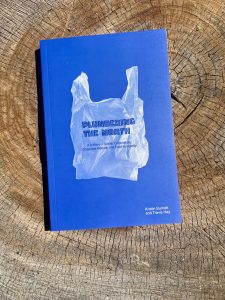There are five books on the 2024 J.W. Dafoe Book Prize shortlist and today we’re going to highlight Kristin Burnett and Travis Hay’s Plundering the North: A History of Settler Colonialism, Corporate Welfare, and Food Insecurity (University of Manitoba Press).
Here’s a Q&A with Burnett and Hay.
What were your goals for this book?
The research began as a community partnership with Indigenous food sovereigntists in northern Ontario who were trying to understand how the current food systems in their communities came to exist, specifically in regards to the monopolistic position of the Hudson’s Bay Company/North West Company (NWC). From there, the project grew to include federal and provincial policies. Our goal was to unsettle the perception that the high cost of food in northern First Nations and Inuit communities is, as the North West Company is so fond of saying, “the cost of doing business.” Importantly, we were able to pass on a copy of Plundering the North to the Minister of Indigenous Services Canada when they met with several Chiefs from Matawa First Nation, a provincial treaty organization in northern Ontario. We hope the book will illustrate to the Minister the harms arising from the ‘solutions’ regarding food insecurity that have been imposed on Indigenous communities.
What have you learned about your process while working on this project? Or is every project unique….
The importance of history in understanding current contexts, responding to popular discourses that situate problems within Indigenous communities rather than in systemic racism and settler colonialism, and the importance of working to support Indigenous sovereignty and self-determination.
What books were important to you while you were writing this book?Who/what are your influences?
We worked with many knowledge holders and Indigenous food sovereigntists. They had an enormous impact on the ways we came to understand what good research looks like, and that relationships with and responsibility to community were essential. Significantly, we were impressed by the hunting/harvesting expertise people possessed and realized very quickly where we needed to go in the event of a zombie outbreak.
Tell me a bit about why you write about “Canada, Canadians and the nation in international affairs.” Why is it important to you?
As settler scholars, we see it as our responsibility to challenge the dominant narratives of Canadian history that position the Canadian state as a natural and neutral phenomenon and a benevolent entity. This is particularly true in the post-World War II period where we see the rise of the welfare state and efforts to alter the food that Indigenous peoples could eat. We also wanted to illustrate how the use of food as a tool of settler colonialism was not unique to Canada. Instead, food has served as, and still is, a tool of settler colonialism across geographic spaces – for instance, Cost-U-Less (a grocery store chain owned by the North West Company) in the Caribbean, Pacific, and Hawaiian Islands. The niche business model that the North West Company perfected in northern Canada in Indigenous communities has been transported to Indigenous communities elsewhere. We need to be particularly cognizant of the social and health disparities produced by food insecurity when we think about corporate profit and the high cost of food, and how they translate across regional, national, and international contexts.
What are you reading right now? What are you writing right now?
Kristin: Currently, I am reading The Birth Certificate: An American History by Susan Pearson which looks at the relationship between birth registration, birth certificates, and the rise of the state. I am co-authoring a book that illuminates the barriers people experience trying to register birth and obtain and retain birth certificates in Canada. It will be published by Fernwood Press and arises out of a broader community-based project that works to improve access to state services and supports for people who have been marginalized or are low income. We hold ID clinics in the region, especially in rural and northern First Nations where there are no service centres, and assist people with both the cost of birth certificate applications and navigating the application process. I am also working on a multi-year project with Kiikenomaga Kikenjigewen Employment and Training Services (KKETS), which is an extension of some themes found in Plundering the North. KKETS is seeking to amplify Indigenous food sovereignty in their member communities in northern Ontario.
Travis: Currently, I am reading memoirs, autobiographies, and fictional novels based on or inspired by real life stories. I am working with an Anishinaabe Elder to tell her life story in both video and written format and need to learn the genre better. I am revisiting Maria Campbell’s Halfbreed, Lee Maracle’s Bobbi Lee, Indian Rebel, and some Asian Canadian memoirs and stories such as Joy Kowaga’s Obasan and Terry Watada’s Mysterious Dreams of the Dead.
The winner of the J.W. Dafoe Book Prize, now valued at $12,000, will be named June 10.


